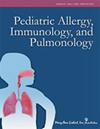食物蛋白诱导的肠结肠炎综合征和ige依赖性食物过敏急性期胸腺和活化调节趋化因子(TARC)水平的比较
IF 0.8
4区 医学
Q4 ALLERGY
引用次数: 1
摘要
食物蛋白诱导的小肠结肠炎综合征(FPIES)患者在急性期胸腺和激活调节趋化因子(TARC)水平升高。然而,据我们所知,还没有研究评估过免疫球蛋白e依赖性食物过敏(IgE-FA)急性期的TARC水平。如果TARC升高是FAs对FPIES的特异性反应,那么TARC测量可能有助于区分FPIES和IgE-FA。因此,我们研究了FPIES和IgE-FA患者急性期TARC水平。方法:选取16例FPIES患者的31次发作和20例IgE-FA患者的20次发作(其中13次为过敏反应)。排除有湿疹的患者。比较两组患者过敏反应发生6小时内的血清TARC水平和年龄调整后的TARC比率(TARC水平除以年龄特异性正常TARC值)。结果:FPIES组和IgE-FA组的中位年龄分别为1.1岁和3.6岁(P P P P = 0.002),经年龄调整后的优势比为17.1 (P = 0.016)。结论:fies患者急性期TARC水平高于IgE-FA患者。急性期TARC水平的升高被认为是FAs患者对FPIES的特异性反应。在急性期测量TARC水平可能有助于区分fies和IgE-FA。本文章由计算机程序翻译,如有差异,请以英文原文为准。
Comparison of Acute Phase Thymus and Activation-Regulated Chemokine (TARC) Levels in Food Protein-Induced Enterocolitis Syndrome and IgE-Dependent Food Allergy.
Introduction: Patients with food protein-induced enterocolitis syndrome (FPIES) have elevated thymus and activation-regulated chemokine (TARC) levels in the acute phase. However, to the best of our knowledge, no study has evaluated TARC levels in the acute phase of immunoglobulin E-dependent food allergy (IgE-FA). If TARC elevation is a specific response to FPIES among FAs, TARC measurement may help distinguish between FPIES and IgE-FA. Thus, we investigated acute phase TARC levels in patients with FPIES and IgE-FA. Methods: Thirty-one episodes in 16 patients with FPIES and 20 episodes (13 were anaphylaxis) in 20 patients with IgE-FA were included. Patients with eczema were excluded. Serum TARC levels within 6 h of allergic reaction onset and age-adjusted TARC ratios (TARC levels divided by age-specific normal TARC values) were compared between the groups. Results: The median age was 1.1 and 3.6 years in the FPIES and IgE-FA groups, respectively (P < 0.001). The median (range) serum TARC (pg/mL) levels were significantly higher in the FPIES group than in the IgE-FA group [1,283 (410-3,821) versus 377 (109-1,539); P < 0.001]. The median (range) age-adjusted TARC ratios were also significantly higher in the FPIES group [2.56 (0.57-7.86) versus 1.08 (0.15-2.17); P < 0.001]. The area under the curve (AUC) for TARC to distinguish FPIES from IgE-FA was 0.926, and the AUC for the age-adjusted TARC ratio was 0.850. The odds ratio for FPIES diagnosis per 1,000 pg/mL increase in TARC was 31.6 (P = 0.002), and the odds ratio adjusted by age was 17.1 (P = 0.016). Conclusion: Acute phase TARC levels were higher in patients with FPIES than in patients with IgE-FA. The increase in acute phase TARC levels was considered to be a specific response to FPIES among FAs. Measurement of TARC levels in the acute phase may help differentiate FPIES from IgE-FA.
求助全文
通过发布文献求助,成功后即可免费获取论文全文。
去求助
来源期刊

Pediatric Allergy Immunology and Pulmonology
ALLERGY-IMMUNOLOGY
CiteScore
2.00
自引率
0.00%
发文量
23
审稿时长
>12 weeks
期刊介绍:
Pediatric Allergy, Immunology, and Pulmonology is a peer-reviewed journal designed to promote understanding and advance the treatment of respiratory, allergic, and immunologic diseases in children. The Journal delivers original translational, clinical, and epidemiologic research on the most common chronic illnesses of children—asthma and allergies—as well as many less common and rare diseases. It emphasizes the developmental implications of the morphological, physiological, pharmacological, and sociological components of these problems, as well as the impact of disease processes on families.
Pediatric Allergy, Immunology, and Pulmonology coverage includes:
-Functional and genetic immune deficiencies-
Interstitial lung diseases-
Both common and rare respiratory, allergic, and immunologic diseases-
Patient care-
Patient education research-
Public health policy-
International health studies
 求助内容:
求助内容: 应助结果提醒方式:
应助结果提醒方式:


